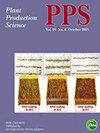叶面施大戟防治番茄细菌性病害、提高果实产量和保质期的效果
IF 1.3
3区 农林科学
Q2 AGRONOMY
引用次数: 0
摘要
细菌性病害是全球番茄产量损失的主要原因,有必要确定控制这些病害的策略。番茄青枯病(Ralstonia solanacearum, RS)和细菌性斑疹病(Xav)是影响番茄作物的细菌性病害。研究了大戟(Euphorbia hirta, E. hirta)甲醇提取物(EHM)对番茄RS和Xav诱导的病害的抑菌活性,以及其提高果实产量的生物刺激素潜力。1280 mg/L的EHM对RS和Xav细菌的生长均有90%的抑制作用。EHM对易感番茄品种Arka Vikas的评价表明,EHM预处理15 d和45 d的番茄植株对青枯病和斑病的抗性分别为1280 mg/L,与对照植株相比,EHM能提高番茄产量和叶绿素b水平。通过对‘纳姆达里ns538’番茄植株的田间评价,进一步证实了EHM的增产效果。叶面施用EHM (1280 mg/L)可使番茄数量和重量增加3.5倍。结果表明,随着乙烯受体因子(ERF1) mRNA水平的升高,果实腐败率显著降低。这项研究首次证明了EHM (1280 mg/L)对番茄的抗菌和生物刺激素潜力具有成本效益和生态友好性。图形抽象本文章由计算机程序翻译,如有差异,请以英文原文为准。
Effect of foliar-applied Euphorbia hirta towards controlling bacterial diseases in tomato crops and enhancing fruit yield and shelf life
ABSTRACT Bacterial diseases are a major cause of yield loss in tomato plants worldwide, and there is a need to identify strategies for control of these diseases. Bacterial wilt caused by Ralstonia solanacearum (RS) and bacterial spot caused by Xanthomonas axonopodis pv vesicatoria (Xav) are amongst the bacterial diseases affecting tomato crops. The current study investigates Euphorbia hirta (E. hirta) methanol extract (EHM) for its antibacterial activity against RS, and Xav induced diseases in tomato plants, along with its biostimulant potential in increasing fruit yield. EHM at 1280 mg/L exhibited 90% inhibition in the growth of both RS and Xav bacteria. Further, evaluation of EHM on Arka Vikas, a susceptible tomato variety, showed that pre-treatment of 15 days and 45 days tomato plants with 1280 mg/L EHM exhibited moderate resistance to bacterial wilt and spot disease, respectively, with increased tomato yield and improved chlorophyll b levels compared to control plants. The effectiveness of EHM in increasing fruit yield was further confirmed using field evaluation on ‘Namdhari NS 538’ variety of tomato plants. A 3.5-fold increase in numbers and weight of tomato was observed with foliar application of EHM (1280 mg/L). A significant reduction in fruit spoilage along with an increase in mRNA level of ethylene receptor factor (ERF1) was also observed. The study is the first to demonstrate the cost-effective and eco-friendly antibacterial and biostimulant potential of EHM (1280 mg/L) for tomato plants. GRAPHICAL ABSTRACT
求助全文
通过发布文献求助,成功后即可免费获取论文全文。
去求助
来源期刊

Plant Production Science
农林科学-农艺学
CiteScore
5.10
自引率
4.00%
发文量
27
审稿时长
>36 weeks
期刊介绍:
Plant Production Science publishes original research reports on field crops and resource plants, their production and related subjects, covering a wide range of sciences; physiology, biotechnology, morphology, ecology, cropping system, production technology and post harvest management. Studies on plant production with special attention to resource management and the environment are also welcome. Field surveys on cropping or farming system are also accepted. Articles with a background in other research areas such as soil science, meteorology, biometry, product process and plant protection will be accepted as long as they are significantly related to plant production.
 求助内容:
求助内容: 应助结果提醒方式:
应助结果提醒方式:


